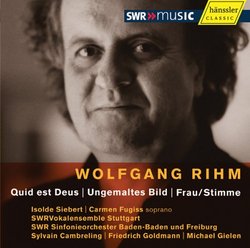"What is God? (Cantata Hermetica)" -- Rihm's 2007 choral com
R. Hutchinson | a world ruled by fossil fuels and fossil minds | 04/02/2010
(4 out of 5 stars)
"The first half of this Volume Four in Hanssler's Rihm Edition series is the new choral work "Quid est Deus fur Chor und Orchester" (33'02 -- 2007), commissioned by the University of Freiburg for its 550th anniversary. Rihm uses as the libretto an ancient text attributed to Hermes Trismegistos which presents the answers of 24 philosophers to the question 'what is God?' (Unfortunately the booklet includes the text only in Latin and German.) The 24 theories take the form of short definitions.
Sylvain Cambreling leads the SWR Vokalensemble Stuttgart and the SWR Sinfonieorchester Baden-Baden und Freiburg in the performance, recorded in November 2007. According to Rihm, "The vocal parts are devoid of all the typical features of contemporary choral practice, but are nonetheless very demanding -- especially in the areas of intonation and articulation." So the text is not fragmented, and is sung without any experimental vocal techniques. Rihm wrote for an orchestra without clarinets, horns or violins, instruments that "guarantee shimmering softness of tone." He emphasizes "low woodwinds, certain brass instruments, and selected percussion with harp and piano" in order to bring "the sound closer to a sphere not primarily experienced as subjective."
Like the other works written by Rihm in the new decade/century/millennium, "Quid est Deus" is decidedly less radical than his earlier compositions. There is some dissonance, true, and some periodic percussive eruptions, but for the most part it is a contemplative work. I wish I had the text in English to fully appreciate it.
The second half of the disc is two works written back-to-back, "Frau/Stimme fur Soprano und Orchester (19'57 -- 1989) and "Ungemaltes Bild fur Orchestra (15'54 -- 1990). Michael Gielen leads the SWR Sinfonieorchester Baden-Baden und Freiburg in "Frau/Stimme" (Woman/Voice) and Friedrich Goldmann leads the same orchestra in "Ungemaltes Bild" (Unpainted Picture). Both works are from Rihm's "less-is-more" period when he incorporated techniques from late period Luigi Nono, Helmut Lachenmann, and Morton Feldman. I find these to be very impressive pieces, but they demand close attention. "Ungemaltes Bild" is mainly quiet and discontinuous, periodically interrupted by percussive outbursts. "Frau/Stimme" is a similar soundworld, but adding the soprano voices of Isolde Siebert and Carmen Fugiss, singing lines from a play by Heiner Muller's play "Der Auftrag":
"I am the angel of despair. With my hands i spread intoxication, numbing, forgetting, the desire and torment of bodies. My speech is silence, my song is the scream. In the shadow of my wings lives terror. My hope is the first battle. I am the knife with the dead break open their coffins. I am the one who will be. My flight is revolt, my heaven the abyss of tomorrow."
A live recording from the Donaueschinger Musiktage, it can also be found in the Musik in Deutschland 1950-2000 Box One from RCA.
An interesting last-minute change was made to the cover graphic, which is still shown in Amazon as a handsome photo of Rihm, following the pattern of the first three Rihm Edition releases. The actual Hanssler disc replaces this with an all-text cover, and displaces the photo to the inlay under the disc. I suspect that this was done so as to avoid any suggestion that Rihm himself was the answer to the question "What is God?"
The composer actively supervises the Hanssler Rihm Edition, which presents recordings from the archives of the SWR. This is another fine installment, though I am not quite as impressed with "Quid est Deus" as I am with most of Rihm's earlier works. By all means seek out Volumes One (concertos), Two (1970s orchestral works), and Three (orchestral and choral works).
I look forward to further entries in the Rihm Edition!"


 Track Listings (3) - Disc #1
Track Listings (3) - Disc #1